Dalmatians are known for their distinctive coat and unique personality. However, like many breeds, they can suffer from various allergies that challenge both their health and their owners’ ability to care for them.
Understanding Dalmatian allergies is crucial for effectively recognizing symptoms and providing timely management. These allergies may manifest in several forms and can be influenced by genetics. For instance, certain conditions like Dalmatian bronzing skin syndrome are thought to be hereditary.
Symptoms can range from skin irritation, such as the “Dal Crud,” to more systemic issues like urinary stones due to their unique uric acid metabolism.

Recognizing the signs of allergies in your Dalmatian is the first step towards ensuring their comfort and health. Allergy symptoms could include itching, redness, hair loss, or gastrointestinal discomfort, depending on the allergen and nature of the reaction.
Management options vary from environmental modifications, like allergen removal and special diets, to medical treatments under veterinarian guidance. Developing a comprehensive care routine can help reduce the risk of allergy-related complications and keep your Dalmatian happy and healthy.
Key Takeaways
- Dalmatian allergies require early identification and understanding for effective management.
- Allergy symptoms in Dalmatians can be cutaneous or systemic, necessitating a variety of management techniques.
- A proactive daily care routine is essential for minimizing your Dalmatian’s allergy symptoms and improving their quality of life.
Understanding Dalmatian Allergies
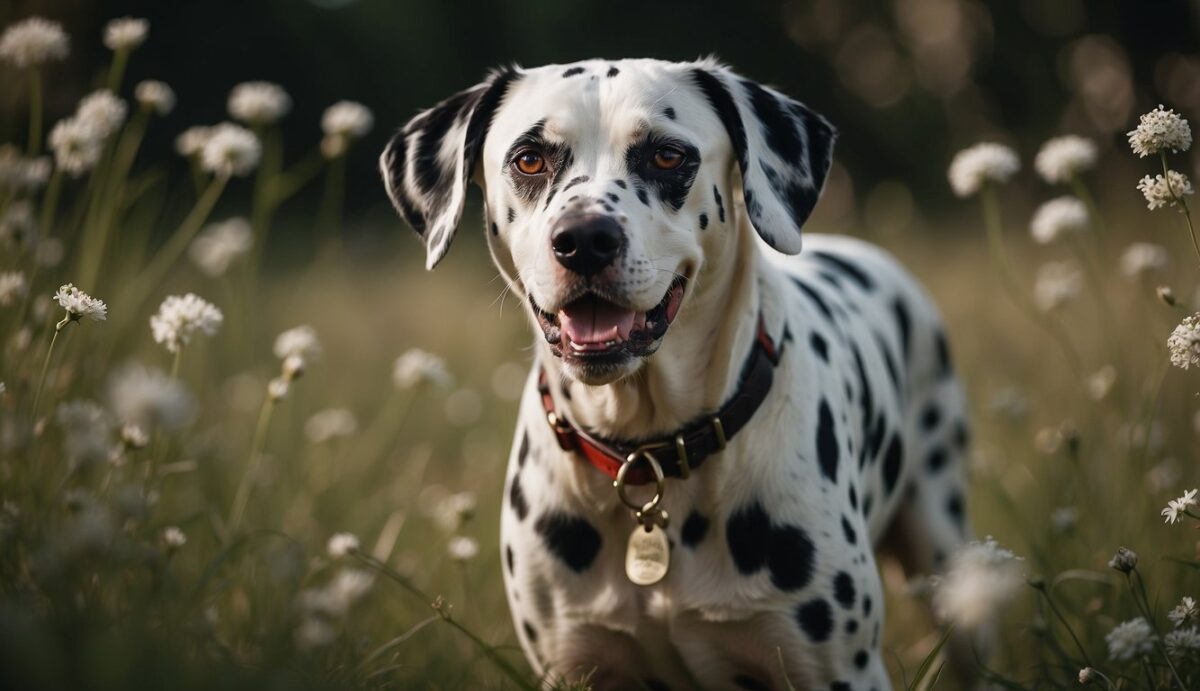
Dalmatian allergies are a vital aspect to consider for your pet’s comfort and health. In this section, you’ll learn about the basics of allergies, what commonly triggers allergic reactions in Dalmatians, and how they compare to other breeds in terms of allergies.
Allergy Basics
Allergies occur when your Dalmatian’s immune system overreacts to substances that are usually harmless. This overreaction can cause a variety of symptoms, which can affect your dog’s skin, respiratory system, or digestive tract. Understanding the immune response is crucial in identifying and managing these allergies.
Common Allergens in Dalmatians
Several allergens can affect Dalmatians, leading to discomfort and allergic reactions. Here are some common triggers:
- Environmental Allergens:
- Pollen
- Mold spores
- Dust mites
- Parasites:
- Fleas
- Mites
- Food Ingredients:
- Certain proteins
- Grains
Dalmatian Allergy Versus Other Breeds
Dalmatians are not hypoallergenic, meaning they typically shed dander which can trigger allergic reactions. Compared to other breeds that might be considered more allergy-friendly, Dalmatians have unique skin issues like the “bronzing skin syndrome.” Allergic reactions depend on an individual’s sensitivity but are not directly correlated to a dog’s breed.
Symptoms and Diagnosis

Understanding how to recognize allergy symptoms in your Dalmatian and the process of diagnosis are crucial to managing your pet’s health.
Recognizing Allergy Symptoms
Your Dalmatian’s skin condition is often the most telltale sign of an allergy. Bronzing skin syndrome, for instance, is characterized by a bronze or pinkish stripe along the back and may be accompanied by hair loss and follicle inflammation. Common allergy-related symptoms also include:
- Itching: Persistent scratching is a clear sign your Dalmatian might be experiencing discomfort due to allergies.
- Hives: Look for red, raised, itchy bumps on the skin.
- Dander: Excessive dander can be both a symptom and a cause of allergic reactions.
- Grooming habits: Increased grooming or scratching can indicate that your pet is trying to relieve an itchy sensation.
Diagnosing Dalmatian Allergies
When it comes to identifying the cause of your Dalmatian’s discomfort, a veterinarian is your best resource. The diagnosis process may include:
- Veterinary examination: A thorough check-up to look for physical signs of allergies.
- Medical history review: Your vet will consider your dog’s medical history, including any previous allergy symptoms or episodes.
- Allergy tests: These may be recommended to determine specific allergens.
- Diet evaluation: To rule out food allergies, a dietary assessment or a food elimination trial might be necessary.
Allergy Management Strategies
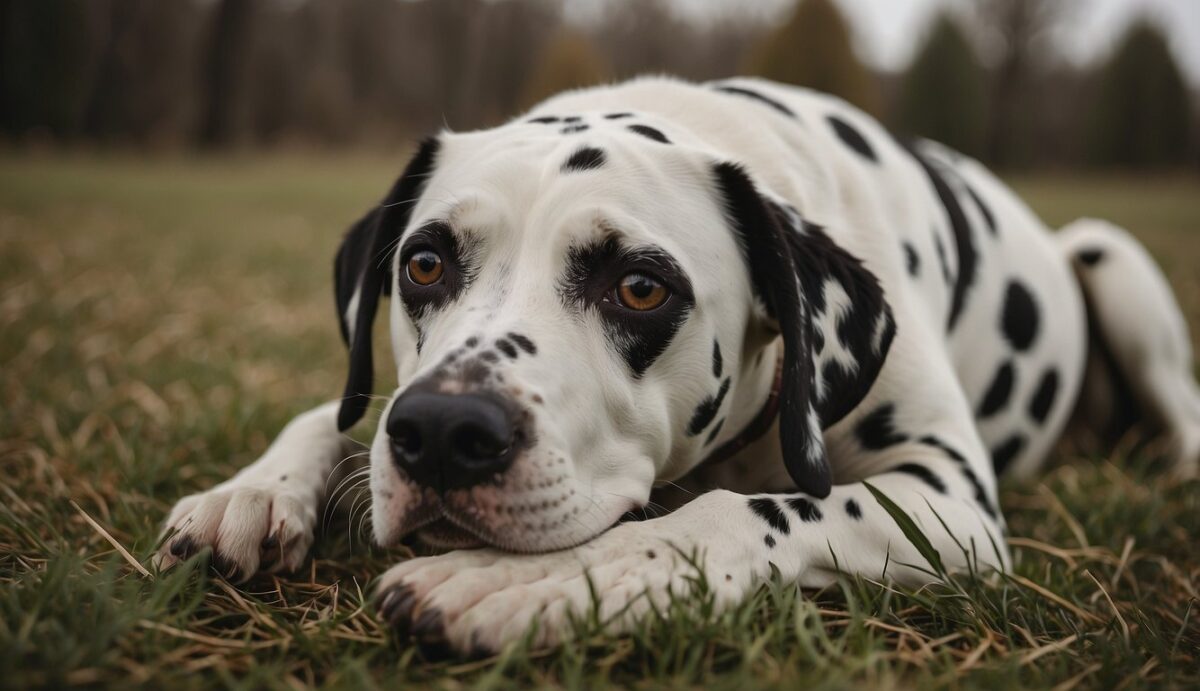
When it comes to managing allergies for you or your Dalmatian, it’s essential to be aware of the treatments and preventive measures that can alleviate symptoms. Understanding what is triggering the allergic responses and knowing how to address them will make life more comfortable for both you and your pet.
Medical Treatments
If you’re dealing with allergic reactions, medical treatments can be pivotal in managing symptoms. Antihistamines are a primary option; they can help to reduce sneezing, itching, and irritation that comes with allergies.
For more severe allergic skin conditions, such as Dalmatian bronzing skin syndrome, corticosteroids can be prescribed due to their anti-inflammatory properties. These medications can be effective in reducing inflammation and discomfort.
For a long-term solution, desensitization therapy might be considered. This involves slowly introducing your body to the allergens to build up a tolerance over time. However, it is a gradual process and requires patience and consistency.
- Medications:
- Antihistamines (e.g., hydroxyzine)
- Corticosteroids (for anti-inflammatory treatment)
- Desensitization injections
Natural and Preventive Measures
Prevention is key. For everyday management, consider implementing an elimination diet if you suspect certain food items are causing allergic reactions. Start by removing common allergens from your diet and then slowly reintroduce them one at a time to determine the cause.
Keeping your environment clean can reduce exposure to allergens significantly. Regular cleaning, using air purifiers, and having a dog-free zone in your home can minimize dander and other triggers.
- Preventive Measures:
- Elimination of allergens from the diet
- Enhanced cleanliness and reduced exposure to allergens
- Use of air purifiers and creation of dog-free zones
Specific Types of Allergies
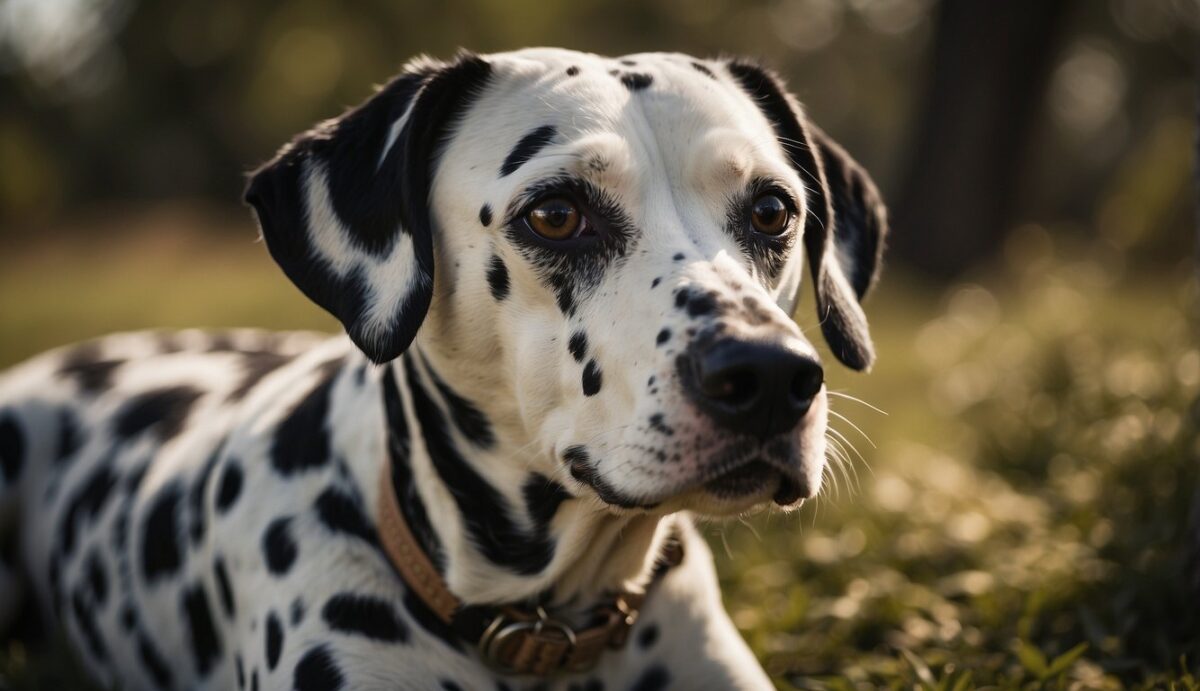
When it comes to your Dalmatian, being aware of the various allergy types can help you manage their health more effectively. Let’s explore the specifics.
Food Allergies in Dalmatians
Your Dalmatian may display an allergic reaction to certain foods. Food allergies typically manifest as itching, gastrointestinal issues, or respiratory problems. Common culprits include beef, dairy, wheat, and chicken. It’s essential to identify the offending ingredient and eliminate it from their diet to alleviate symptoms.
Skin and Environmental Allergies
Skin problems in Dalmatians can often be traced back to environmental factors or flea allergies. Dalmatian bronzing skin syndrome—a hereditary condition—results in a stripe of bronze or pinkish skin, accompanied by hair loss, and inflammation. Seasonal allergies can also affect your Dalmatian, leading to itchy, red skin during certain times of the year.
Other Allergy Types in Dalmatians
Besides food and skin concerns, Dalmatians may react to components in their environment. Saliva from grooming can lead to allergens being spread around their coat. Potential triggers like certain fabrics or cleaning products could evoke an allergic response. Regular observation and veterinary consultations are key to managing these concerns.
Daily Care for Dalmatian Allergies
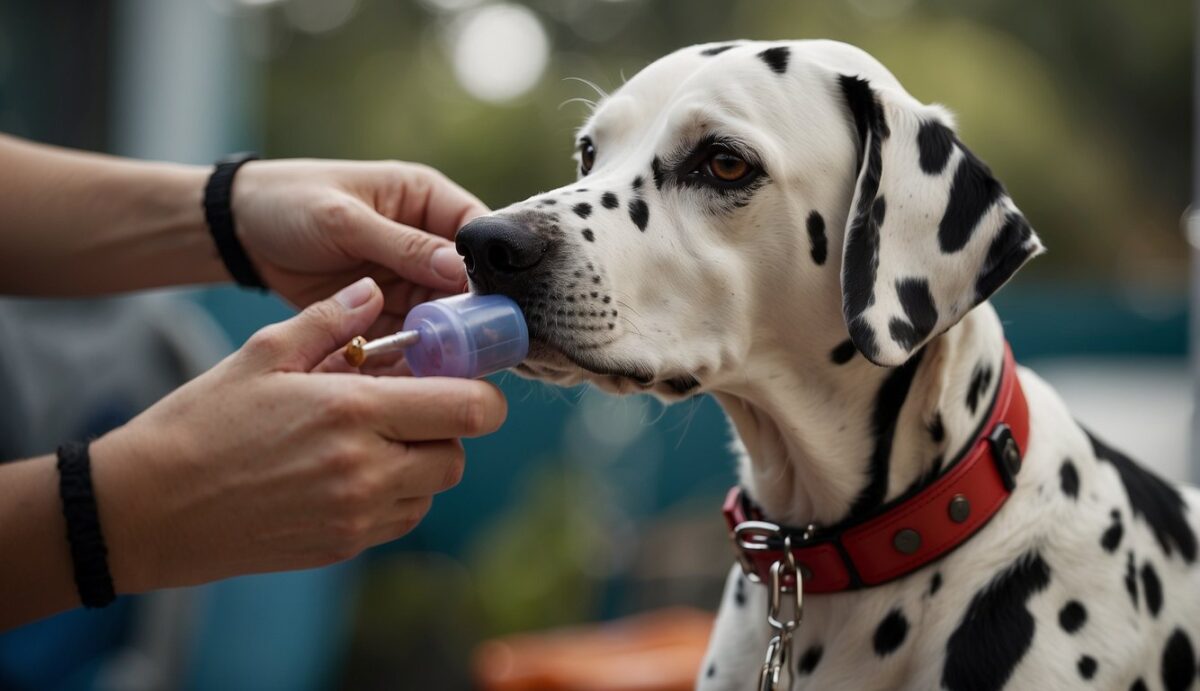
Managing allergies in Dalmatians involves daily care routines that focus on grooming and diet. By paying attention to these aspects, you can help minimize your Dalmatian’s skin problems and ensure they remain comfortable and healthy.
Importance of Grooming and Cleaning
Grooming: Your Dalmatian’s coat requires regular grooming to control shedding, which not only helps your dog stay clean but also reduces the amount of hair and dander in your environment. Brushing your pet several times a week with a bristle brush can effectively remove loose hairs and potential allergens.
- Bathing: Select a hypoallergenic shampoo and bathe your Dalmatian every couple of months or as needed. Bathing too frequently can strip their coat of natural oils and worsen skin issues. Always ensure you rinse thoroughly to prevent shampoo residue, which can irritate your dog’s skin.
Remember, grooming is also a good time to check for any skin irregularities such as pinkish coloration, hair loss, or inflammation, which could indicate an issue such as bronzing skin syndrome.
Diet Considerations and Supplements
Food Allergies: Keep an eye out for symptoms of food allergies, which can manifest as skin irritations or gastrointestinal problems. If you suspect food allergies, consult your vet who may recommend an elimination diet to identify the offending proteins.
- Safe Supplements: Incorporating supplements into your Dalmatian’s diet can promote healthy skin and coat. Fish oil supplements, rich in omega-3 fatty acids, are known to reduce inflammation and improve skin conditions. However, you should consult with your vet before adding any supplements to your dog’s diet.
Living with a Dalmatian with Allergies
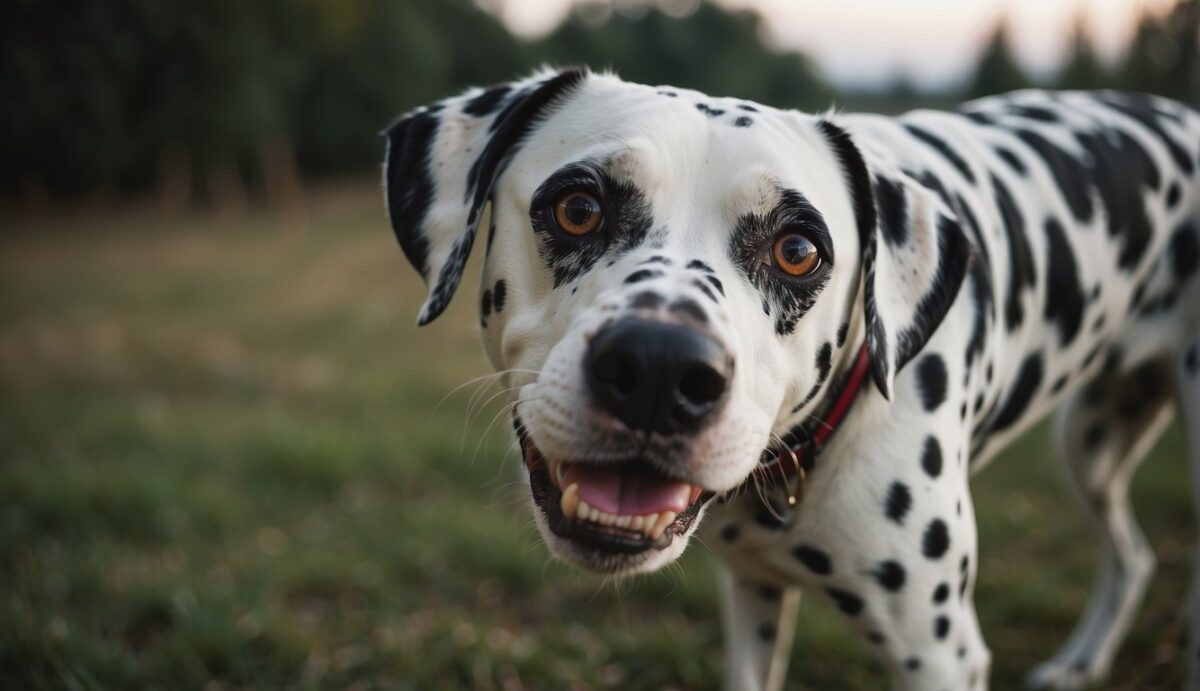
When you choose to bring a Dalmatian into your home, preparing to manage their allergies is crucial for a comfortable coexistence.
Home Environment Adaptations
For your Dalmatian’s skin and coat: Allergens can irritate your dog’s skin, so it’s essential to maintain a clean, safe environment.
Air purifiers can greatly reduce airborne allergens, and frequent vacuuming can minimize dander and dust.
Consider using hypoallergenic bedding and routinely wash it to ensure a clean resting area for your puppy.
- Air Quality: Use HEPA air purifiers to clear airborne allergens.
- Clean Surfaces: Regularly clean floors and your dog’s favorite spots.
- Bedding: Choose hypoallergenic materials for your Dalmatian’s bed and wash them weekly.
Prevention in your routine: Integrating allergy management into daily care helps prevent issues from arising.
Regular baths with a gentle, hypoallergenic shampoo can keep your Dalmatian’s coat clear of irritants.
After walks or playtime outside, wiping down your dog’s coat and paws can remove pollen or other irritants they may have encountered.
Brushing: Daily brushing not only reduces shedding but also distributes skin oils which can protect against irritants.
Addressing Behavioral Concerns
Understanding your dog’s behavior: Dogs with allergies may exhibit signs of discomfort, such as excessive scratching or biting their skin.
Recognize these behaviors as potential indicators of allergies and address them promptly with a veterinarian’s guidance.
- Regular Check-ups: Ensure your Dalmatian has regular vet visits for allergy assessments.
- Spot the Signs: Keep an eye out for excessive scratching, biting, or licking as signs of discomfort.
- Soothing Products: Consult your vet about topical creams or treatments that can offer relief.
Training for management: Training your Dalmatian to tolerate baths and grooming can prevent stress for both you and your dog.
Positive reinforcement can help your dog associate allergy-prevention measures with pleasant experiences.
- Positive Reinforcement: Use treats and praise to create positive associations with grooming and care routines.
- Desensitization: Gradually introduce your dog to baths and grooming to make the experiences less stressful.
Advanced Topics in Allergy Management
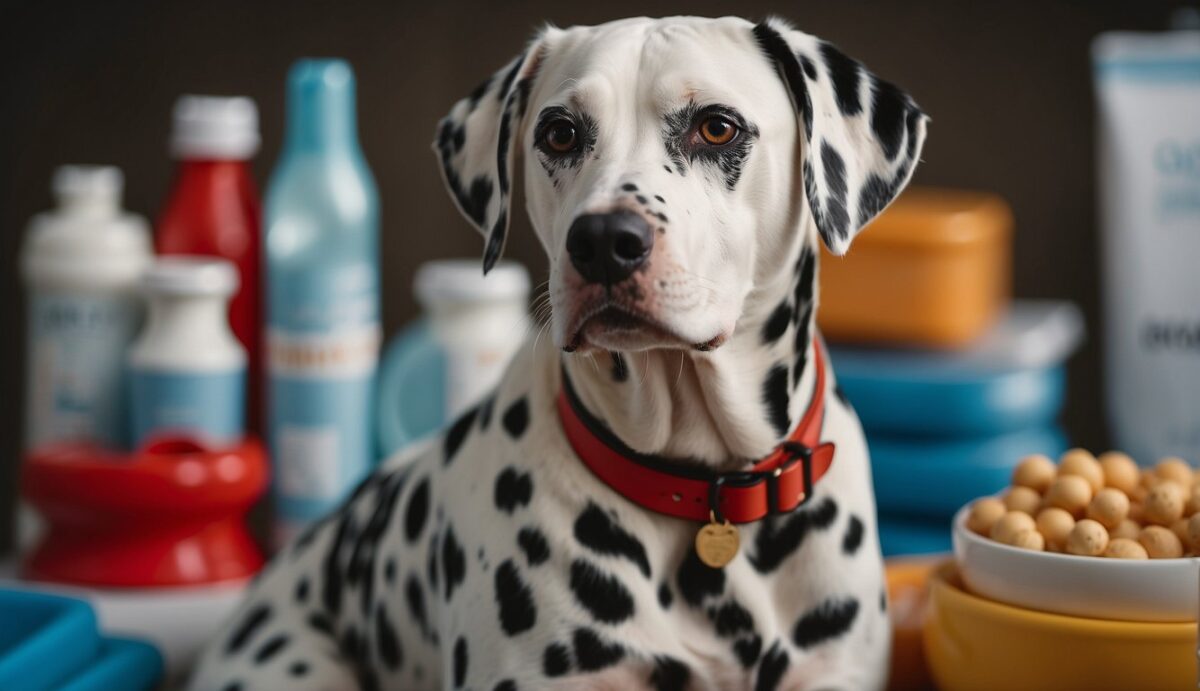
In this section, you’ll explore the latest developments in allergy management for your Dalmatian, especially concerning new research findings and therapies.
It’s important to understand these advancements to ensure the best care for your pet and to be aware of potential side effects associated with new treatments.
Research and Emerging Therapies
Recent research has made strides in identifying novel treatments for managing allergies in Dalmatians.
One promising area is the use of biologics, which are specialized drugs designed to target specific components of the immune system.
These advanced medications can help manage severe allergic reactions by neutralizing the action of certain immune cells or proteins involved in the allergic response.
- Immunotherapy: Tailored for your dog’s specific allergens, this treatment involves administering gradually increasing doses of the allergen to build up your pet’s tolerance.
- Monoclonal antibodies: These are new types of medications that can selectively bind to immune system components, like IgE, reducing allergic symptoms.
Often, these emerging therapies have been developed following extensive clinical trials to ensure their efficacy and safety for your Dalmatian.
Be sure to consult with your veterinarian about the availability of these cutting-edge options.
Understanding Potential Side Effects
When considering advanced allergy management, it’s crucial to weigh the benefits against any potential side effects.
All medications, including antihistamines and newer drugs, can have side effects, which typically vary from one individual to another.
| Drug Type | Common Side Effects | Notes |
|---|---|---|
| Antihistamines | Drowsiness, dry mouth | Generally mild; monitor your pet for drowsiness |
| Corticosteroids | Increased thirst, hunger | Longer-term use may lead to more serious effects |
| Monoclonal Antibodies | Vomiting, diarrhea | Rare; monitor your pet after administration |
Always discuss the side effects of any new medication with your veterinarian.
They can provide you with the information needed to make an informed decision regarding your Dalmatian’s health care regimen.
Remember, the goal is to keep your furry friend comfortable while minimizing any adverse reactions.
Support and Resources
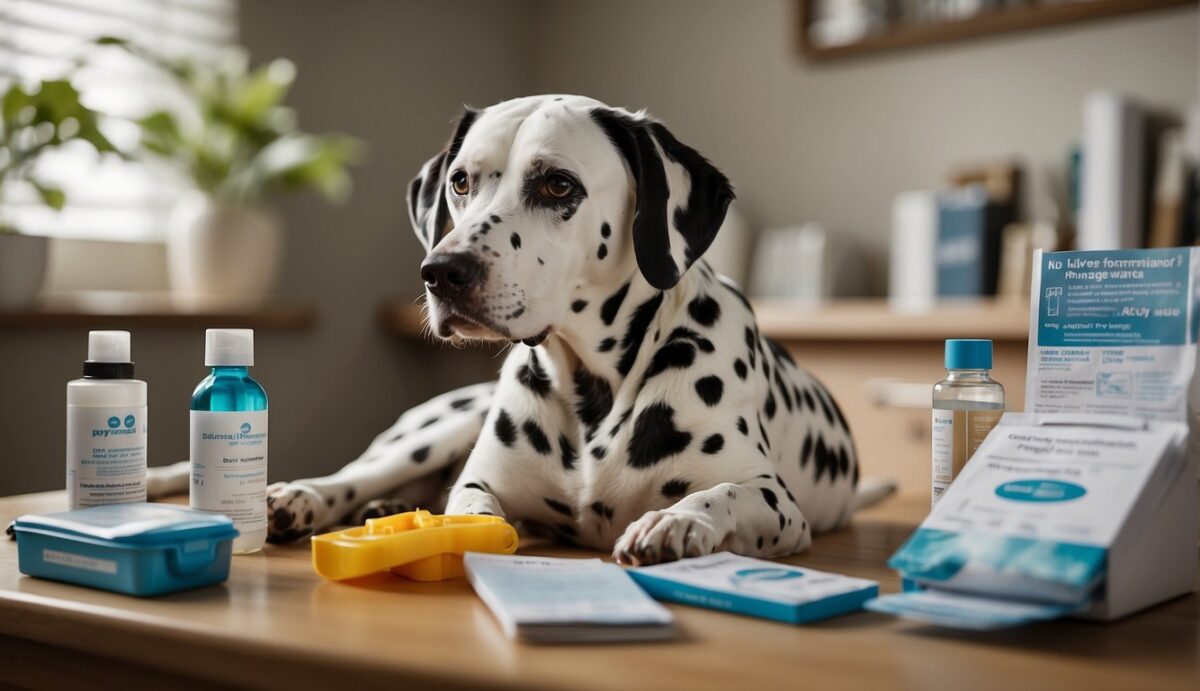
When facing allergies in your Dalmatian, the right support can make all the difference. Here’s where you can find help and resources to manage your dog’s condition effectively.
Finding Help from Veterinarians
Your veterinarian is the cornerstone of allergy management for your Dalmatian. They can provide:
- Accurate diagnosis: Based on symptoms and tests
- Treatment plans: Tailored to your dog’s specific needs
- Ongoing support: Regular check-ups and adjustments to treatments
To ensure you have access to the best information and care, consider the following:
- Establish a regular vet: Having a regular veterinarian will help ensure your dog’s health records are up-to-date, and they are familiar with your dog’s medical history.
- Ask for referrals: If your vet suspects complex allergy issues, don’t hesitate to ask for a referral to a specialist, such as a veterinary dermatologist.
- Seek second opinions if necessary: If treatments aren’t effective, it’s okay to seek a second opinion from another knowledgeable veterinarian.
Online and Community Support
In addition to professional veterinary guidance, online and community support can offer valuable insights and emotional support.
- Forums and Social Media Groups: Places where you can share experiences and get advice from other Dalmatian owners
- Educational Websites: Trusted sources where you can find articles and guides on managing canine allergies
Here are some tips for engaging online:
- Evaluate the source: Make sure the information is from reputable sites or experienced individuals.
- Stay engaged: Regular participation in discussions can provide ongoing tips and moral support.
Frequently Asked Questions
In this section, you’ll find targeted answers to common questions about Dalmatian allergies, which will help you understand symptoms and manage your dog’s condition effectively.
What are the common symptoms of allergies in Dalmatians?
If your Dalmatian is experiencing allergies, you may notice symptoms such as itchy skin, hair loss, and possibly digestive issues. Skin allergies may manifest as redness or irritation.
How can I identify and manage bronzing skin syndrome in Dalmatians?
Bronzing skin syndrome appears as a stripe of bronze or pink coloration along your Dalmatian’s back and can include hair loss. This hereditary condition should be addressed with the help of your veterinarian for proper management.
Are there any specific shampoos recommended for Dalmatians with sensitive skin?
For Dalmatians with sensitive skin, hypoallergenic or oatmeal-based shampoos can be soothing. Always patch test a new shampoo on a small area of your dog’s skin before full use.
How do I determine if my Dalmatian is prone to allergies?
Determining if your Dalmatian is prone to allergies often involves monitoring for common symptoms and possibly consulting a veterinarian for allergy testing, especially if you notice persistent skin irritation or gastrointestinal problems.
What treatment options are available for Dalmatians experiencing skin diseases?
Treatment options can vary from special diets and supplements to medicated shampoos and prescription medications. A vet can provide the most appropriate treatments based on your dog’s specific needs.
Can Dalmatians with allergies live comfortably, and how can I make my home allergy-friendly for them?
Yes, Dalmatians with allergies can live comfortably. To make your home allergy-friendly, you can reduce exposure to allergens with regular cleaning, use air filters, and designate dog-free zones to minimize dander.

